The Canadian federal election of 2011 : was Diefenbaker right about polls?
Mar 4th, 2011 | By Counterweights Editors | Category: Ottawa Scene
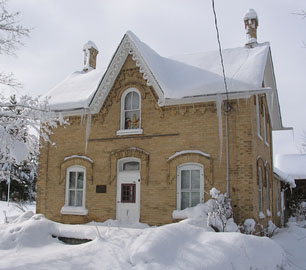
Birthplace of John Diefenbaker, Neustadt, Ontario. Like Stephen Harper, Diefenbaker was born in Ontario and then moved to Western Canada. But he moved to Saskatchewan with his parents when he was only 8 years old.
[UPDATED MARCH 7, 9, 11, 16, 25, 30, APRIL 5, 8, 11, 13, 22, MAY 1, 3]. Le Devoir, in the most politically sophisticated region of Canada’s wonderland, may have already pronounced the simplest truth (or dare) on the Canadian federal election of 2011:
“Flaherty ferme la porte au compromis sur le budget … Le dépôt du budget le 22 mars confirme les scénarios électoraux évoqués depuis cinq semaines. Le premier vote de confiance budgétaire pourrait avoir lieu au plus tôt le jeudi 24 mars, mais plus probablement le mardi 29. Si les conservateurs n’obtiennent pas d’appuis à la Chambre des communes, des élections seront déclenchées. Le scrutin aurait alors lieu le 2 ou le 9 mai.”
There are still those who think the New Democrats might back the Flaherty budget, and prevent an election in the merry month of May (a prospect that may have been slightly enhanced by “NDP Leader Jack Layton will undergo hip surgery Friday”?). And “small signs emerged on Parliament Hill on Wednesday suggesting there’s still a chance the Bloc Québécois will vote to keep Prime Minister Stephen Harper in power.”
Assuming we the diverse Canadian people will nonetheless be going to the polls that count yet again sometime around May 2 or 9, 2011, what do the latest polls that don’t count – directly at any rate – say about the likely results of the ones that do – or will, probably, maybe, two months from now? And/or was John Diefenbaker from Saskatchewan, Conservative prime minister of Canada, 1957—1963, essentially right, when he so memorably said “dogs know best what to do with polls” (or, more succinctly, “Polls Are for Dogs”)?
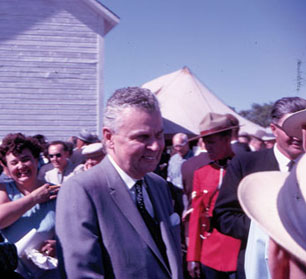
"The Chief" at Batoche, Saskatchewan, battleground of the second Riel Rebellion, June 1961. Photo : Everett Baker, Saskatchewan History and Folklore Society.
It just may be that we are into one of those strange eras in which the late Mr. Diefenbaker (1895—1979) does make sense. An article in yesterday’s Toronto Star (“Conflicting numbers fuel debate over political polls”) summarized one side of the story:
“A new poll by Harris-Decima for The Canadian Press added Wednesday to the confusing mix of surveys released over the past week … It put Tory support at 36 per cent, the Liberals at 28 and the NDP at 15 … The telephone survey of 2,020 people was conducted between Feb. 17 and Feb. 27 … The results are in sharp contrast to other recent surveys which have put the Tories as high as 43 per cent, 16 points ahead of the Liberals, and as low as 32 per cent, statistically tied with the Liberals.”
* * * *
Another side of the story was sketched last Friday by Susan Riley of Postmedia News, in the Calgary Herald and other such places:
“Harris-Decima chairman Allan Gregg, Canada’s first celebrity pollster, is worried about the profusion of increasingly unreliable polls, the unhealthy relationship between unqualified pollsters and headline-hungry media and confident assertions based on flimsy data … As he told Joan Bryden of Canadian Press, response rates to telephone surveys have fallen to 15 per cent – partly because more people use cells, have call screening, or just hang up. So phone polls skew to-wards the elderly, rural and less educated, while online polls reflect younger, better-educated, urban respondents. Both methods produce ‘highly imperfect samples,’ says Gregg.”
At the same time, “Gregg has incurred the wrath of some of his competitors since he went public last month with blunt criticism of the methodological problems facing the industry and the penchant of pollsters and reporters to over-hype dubious between-election political survey results. His views were echoed by several other pollsters in a story by The Canadian Press but Gregg, a high profile, veteran pollster, has taken most of the heat.”
In response, “the Market Research and Intelligence Association (MRIA), the industry’s voluntary self-regulating body” has “fought back with a full-page ad in the parliamentary precinct newspaper, The Hill Times.” This ad “maintained that public opinion research in Canada is ‘both valid and reliable.’ As proof, it cited the accuracy of polls in predicting the outcomes of the past two federal elections.”
Mr. Gregg himself has tried to clarify: “he’s not arguing that polls should be ignored; only that their import needs to be interpreted much more cautiously. Rather than pontificate on weekly fluctuations in individual polls, he said it makes more sense to average the results of various surveys and look at the trends over longer periods of time.”
Even viewed in this cautious way, however, the overwhelming weight of virtually all the polling data from the past several months seems clear enough. Barring the emergence of some dramatic new factor over the next two months (certainly not inconceivable, but what would it be?), the Harper Conservatives are most likely to once again win the greatest number of seats in the Canadian House of Commons – as in 2006 and 2008.
What remain unclear – or so it seems at the moment – are the answers to such questions as whether the Harper Conservatives will finally win a majority of seats (with considerably less than a majority of the popular vote, not unlike the Chretien Liberals and others in the more recent Canadian past), and (perhaps) just how much better the Ignatieff Liberals may (or may not) finally perform than current poll-based expectations suggest?

Carl Schaefer’s classic “Ontario Farmhouse” painting, 1934. Vaguely reminiscent of John Diefenbaker’s birthplace in Neustadt. The Harper Conservatives’ considerable support in Ontario today also has more than a little to do with the voters who still live in such places.
Of course, campaigns do make a difference – and if there is an election early this May it could be one where what happens in the actual campaign is crucial. And two months can still be two light years in politics.
So far no dramatic new factor seems to us to have arisen (not Bev Oda, Conservative election spending in 2006, the Canada-US security perimeter discussions, or the London-Toronto stock exchange merger proposal, eg). But there is still time. And, while “From pre-writ polls to election day, history is not on Ignatieff’s side,” surprise has played a recurrent role in the story of Canadian federal politics since 2004. And who knows? There could be some new surprise (of some sort) awaiting all of us who are paying attention between now and the early days of May.
There is always some sense in which almost anything can happen in politics – and especially democratic politics. (And: “If there is a silver lining for the Liberals, it is that in six of the nine [most recent Canadian federal] elections it was the government that lost support.”)
* * * *
Meanwhile, in researching this piece our excellent office interns stumbled across an intriguing new (to us at any rate) human interest angle in the story of John George Diefenbaker – whose career in some ways (if certainly not in others) somewhat parallels that of Stephen Harper.
Very quickly, a 40-something Torontonian, John George Dryden, has recently filed a court claim alleging that he is the natural son of John George Diefenbaker, Prime Minister of Canada, 1957—1963. Up to now, it has been believed that Mr. Diefenbaker, although married twice, had no natural children of his own. (He did have a stepdaughter from his second marriage.)
If John George Dryden’s claim were to be finally borne out – and on a very hasty look it seems not entirely implausible to us – that would constitute an engaging footnote to the current historical record. And, on the broader front of today’s key current events in Ottawa, engaging footnotes may be the best we can hope for from Canadian federal politics at the present juncture as well (not unlike in the late 1950s and early 1960s?).
You can dig into the details of John George Dryden’s claim for yourself, if you are so inclined, in two National Post articles by Kathryn Blaze Carlson, from this past January: “The Diefenbaker gambit”, and “Several options to get DNA for Diefenbaker civil suit” … as we all await the fate of Mr. Flaherty’s federal budget at the end of this month.
UPDATE MAY 3: Well it’s all over today! See the counterweights editors on “A historic unnecessary election .. probably .. and now there’s only one party responsible for the next four years” …
UPDATE MAY 1: See the counterweights editors on “Nothing dead certain about end of surprising and unsettling Canadian federal election campaign of 2011.”
UPDATE APRIL 22: At last, with just over a week before voting day on May 2, 2011, there is a glimmer of progressive light at the end of the tunnel. See Randall White on “Canadian election 2011 .. now it seems things are starting to get interesting .. maybe (would you believe PM Jack?).” And for a half-prescient counterweights editors’ post from almost 11 months ago, try “More news on coalition blues .. a PM Layton could win (with Quebec spin)?”
UPDATE APRIL 13, 11:15 PM ET: There may or may not be a few further straws in the wind today – the real extent of which may or may not be clearer by the weekend? On our site here see Randall White’s “First debate may mean Harper majority is closer .. but what if Iggy turns out like Joe Clark in 1979?” Two intriguing items from more technical polling sites are: “April 13th: New Ekos poll – Best scenario for the Liberals so far” at Too Close To Call ; and “So I heard some polls came out today” at ThreeHundredEight.com. For what may or may not be signs of increasingly restless distant drums try “Scatological attack on Stephen Harper’s record goes viral” in the Globe and Mail. There also seems some broad agreement that Ignatieff did better in tonight’s French debate than in last night’s English debate – and Harper did worse. But does this count?
UPDATE APRIL 11: There has been a fresh flutter of excitement today, on the eve of the English language leaders’ debate on TV tomorrow. See “Will AG’s not-so-secret G8 spending report be the straw that at least breaks the Harper Conservative lead a little?”
UPDATE APRIL 8: Still no big surprises at the end of the second week of the Canadian federal election of 2011 campaign. But with three weeks still to go there may be a few straws in the wind, maybe? See our “One side of Mountie culture does look pro “Harper Government” .. and other noise along the campaign trail.”
UPDATE APRIL 5: We’re well into the action now. See: “Canadian federal election of 2011 : That was the first week that was – don’t jump to any conclusions yet!” and “Fear and hatred on the campaign trail in Canada .. is this Unknown Country about to become still more unknown?”
UPDATE MARCH 30: As Randall Palmer reported five days ago, one big question about the Canadian federal election on May 2, 2011 is will the Harper Conservatives win a majority of seats in the elected branch of Parliament at last? And what would happen if they did? See Citizen X on “Would Harper majority government in Canada be like Cameron-Clegg coalition government in UK?”
UPDATE MARCH 25, 12:30 PM ET: Assuming all goes according to schedule in the Canadian House of Commons, the Harper Government will fall one hour from now, and we will be on our way to a spring election at last. Randall Palmer at Reuters has an interesting article on the broader picture: “Harper to push for elusive majority.” Our own resident Ontario historian Randall White believes that, whatever else, the coming election will have some practical benefits for the country. See his “Canadian federal election 2011 is its own economic action plan!” …
2:22 PM ET: Just under an hour later than indicated above, the Harper Government has been defeated, 156—145, on a “Contempt of Parliament” motion of non-confidence, for the first time in Canadian history (and perhaps even in some wider history of parliamentary democracy?). Now, “PM to visit Governor-General Saturday morning” (ie tomorrow) – after which the exact date of the election (probably May 2, 2011?) will be announced.
UPDATE MARCH 16: Two weeks from now, at the latest, or as early as March 25, we should at last know whether it is finally going to happen, in the real world of Canadian federal politics (if that isn’t an oxymoron in its own right). Meanwhile, see Citizen X on “Does anyone really believe PM Harper Government doesn’t want a spring election … etc, etc, etc?“.
UPDATE MARCH 11: The plot on the polls question has thickened somewhat yet again. See Randall White on “Will still more bad opposition polls kill Canadian spring election in the end?“
UPDATE MARCH 9: The opposition majority continues to explore ways of defeating the minority government, in one respect or another, by focusing on abuses of power rather than economic management and the budget. See Randall White’s “The Canadian federal election of 2011 : can opposition get Harper on abuse of power instead of budget?” And note various TV and press reports today: “Election-hungry opposition keeps snapping at Tories” ; “Speaker’s ruling could open door to election push” ; “Kenney takes heat over ‘award of excellence’ bearing Tory logo” ; and “Wounded soldier denounces aid plan … A major who lost both his legs in Afghanistan says the Harper government’s financial treatment of injured war veterans is an “abject betrayal” of a new generation of soldiers.”
UPDATE MARCH 7: The Globe and Mail has reported today: “Ottawa rumour mill in overdrive about plan to take down the Tories … Any day, House of Commons Speaker Peter Milliken will issue rulings in response to two separate claims by Liberal MPs that the Conservatives are acting in contempt of Parliament. One, from Liberal MP John McKay, relates to accusations International Co-operation minister Bev Oda misled Parliament and had a document doctored. The other, from Liberal MP Scott Brison, asks the Speaker to find the government in contempt for refusing to fully disclose the cost of government crime bills …
“If either ruling sides with the Liberals, either MP could immediately move a motion of non-confidence in the government. While it is possible this could happen this week, it is more likely to come to a head after next week’s one-week Commons recess … The possible Liberal tactic is an alternative to defeating the budget and challenging the Tories on one of their strongest files — the economy … Canadians are willing to give the Conservatives good marks for economic management, said Harris-Decima pollster Bruce Anderson, meaning the opposition would be wise to avoid framing an election around what is or is not in the budget.”
Both the New Democrats and the BQ would of course have to join the Liberals to finally bring the government down in a non-confidence motion like this. And it’s easy to wonder about how likely this prospect is.
The rumours are no doubt interesting in any case. And they may well suggest that, one way or another, there really is going to be another federal election soon. (Or not too, of course as well.) There was a parallel report in the Globe and Mail yesterday: “Will Liberals try to topple Tories before budget is tabled?“
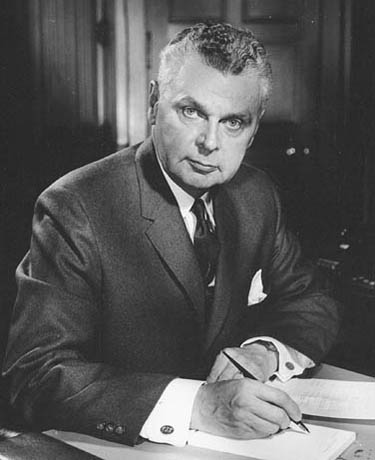

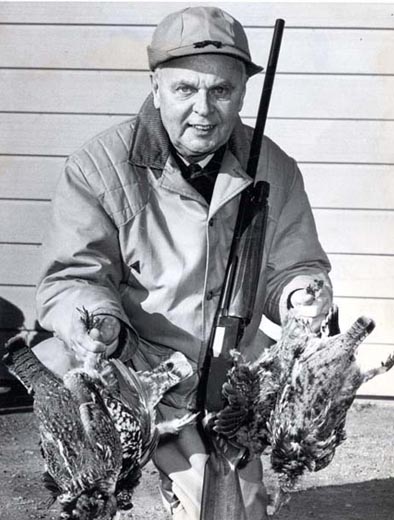
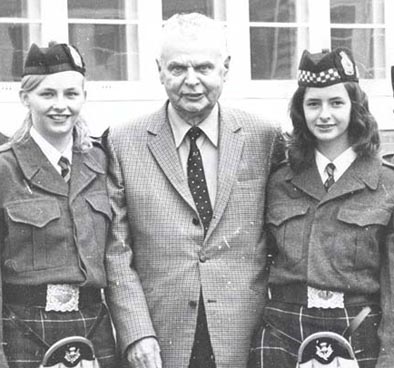
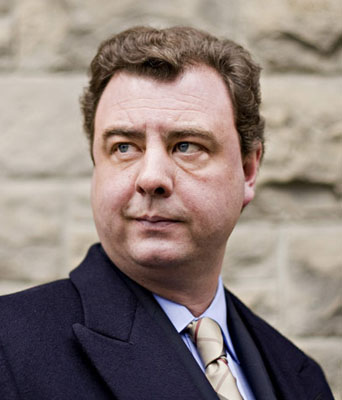


[…] more: The Canadian federal election of 2011 : was Diefenbaker right … Share and […]
The Daily Conservative has once again picked up one of our pieces, which we note in a bipartisan spirit (we’re just trying to be objective!) : http://thedailyconservative.net/2011/03/04/the-canadian-federal-election-of-2011-was-diefenbaker-right/
This is an excellent article. As a public opinion specialist in the academic field, I can tell you that the problems that are summarized in this paper are problems that academicians try to inform journalists for years now.
People have to understand that marketing research is 99% of what a pollster do. Political surveys are, for pollster, essentially about visibility : the only way to establish the credibility of the survey technique is to predict election results, there is no other way to demonstrate empirically the validity of the technique. Then, pollsters will link this ability to predict elections to their ability to scientifically make marketing research. But there is a huge difference between asking people for their buying habits or their vote intention (practical questions) and asking them questions on issues on which they might not be really informed (usually highly unpractical questions).
Also, the rising problems with survey sample, as discussed in the paper, is a real concern. In the two last Québec provincial elections, pollsters had a very hard time predicting the results. If in most cases they were right on the winner, results in the polls compared to the election results were way off margins of error. Québec election of 2007 is a striking example of this.
Usually, I tell people that they are projecting their own hopes when they say that although their preferred party is not leading in the polls, they believe that somehow the campaign will turn things around. This time, I think liberals are right to think the polls might not actually be that important in this election.
1. Because of the sampling problems that we now face and that tends to elude the young and urban vote (mostly liberal and NDP).
2. Because we had a lot of national elections recently and therefore it is totally normal that there is an increasing gap between the political activity (raised by all those elections) and the public level of level of political attention (which stays stable and rises during political campaign). Therefore, the 2011 campaign might have a greater impact than campaign usually do.